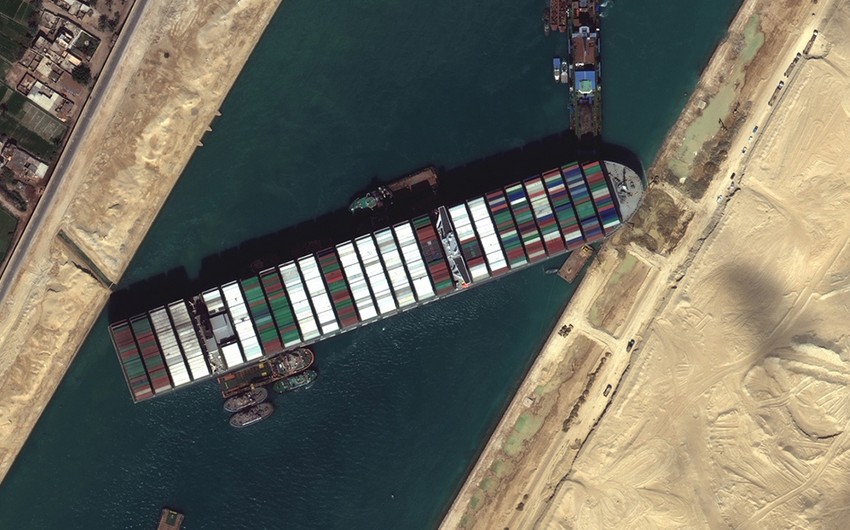Last month, a container ship stuck in a shallow part of the Suez Canal, which connects the Mediterranean and Red Seas, causing a major blockage in the canal and dealing a severe blow to the economy. It is estimated that the canal's weekly closure will cost the world economy an additional $10 billion.
The Suez accident affected almost all economic sectors, including energy. Transportation of liquefied natural gas (LNG) to Europe has been complicated, resulting in higher oil prices on world markets. On the day of the accident, the price hike was about 5%. The current situation actualizes the Trans-Caspian International Transport Route, which is implemented with Azerbaijan's participation, starting from China, to increase freight turnover between Central Asian countries, the Caspian-Black Sea basin, and European countries. Report studied experts' views in this regard.
Rufat Bayramov, National Secretary for Azerbaijan of the Intergovernmental Commission for the Europe-Caucasus-Asia Transport Corridor (TRACECA), says that the Suez Canal creates opportunities for the actualization of the Trans-Caspian project.
The current situation is a new chance for the Trans-Caspian corridor as well
Rufat BayramovTRASECA National Secretary for Azerbaijan
"12% of the world's cargo was transported through the Suez Canal. In particular, almost 93% of freight traffic between China and Europe is carried through the Suez Canal. The situation in the Suez Canal highlights the need to diversify other existing corridors. The current situation is a new chance for the Trans-Caspian corridor. In this case, there are good opportunities for more cargo transportation via Azerbaijan. Another issue that arose during the pandemic was the multifold increase in shipping prices. It creates new opportunities for us to actualize our corridor and attract more container cargo. At present, we are developing a strategy to increase container traffic within TRASECA by 2030," he said.
Economist Rashad Hasanov also said that the Suez Canal events indirectly affect the relevance of the Trans-Caspian route.
To some extent, this event can have a positive impact on the direct and more flexible participation of European countries in the implementation of the Trans-Caspian route and its financing.
Rashad HasanovEconomist-expert
"Although the Trans-Caspian route targets slightly different regions, such situations raise the issue of diversification of transport routes. If we approach the issue from this aspect, the urgency of the Trans-Caspian corridor may increase. The Trans-Caspian project has been under discussion for many years. Although the Suez Canal incident indirectly affects this corridor's relevance, it is not correct to speak of a direct impact here, as the markets and destinations are different. But indirectly, this problem raises the Trans-Caspian issue, especially for European markets. European markets have recently taken steps to diversify their energy supply. It is a priority of their energy policy. The Suez Canal incident also exacerbated problems in direct transportation to European markets, especially of energy products. From this point of view, I think that this event can, to some extent, have a positive impact on the direct and more flexible participation of European countries in the implementation of the Trans-Caspian route and its financing.
Economist Parviz Heydarov spoke about the importance of the Trans-Caspian project for European countries:
If the Trans-Caspian route is implemented and the gas reserves from Central Asian countries are exported to Europe, it will be an essential diversification in world markets, as well as in the energy supply to Europe.
Parviz HeydarovEconomist expert
"Europe is interested in the transportation of natural resources of Central Asian countries to world markets by alternative means, i.e., bypassing Russia, at least to the Mediterranean Sea. It was unrealistic for European countries to take any direct steps in this area. Azerbaijan's position and Azerbaijan's policy of acting as a strategic transit country using its favorable geographical opportunities in this area fully meet European countries' aspirations. The Baku-Tbilisi-Ceyhan main export pipeline has been transporting oil from Central Asian countries for a long time. It, in itself, is an alternative. With the Southern Gas Corridor opening, there is an alternative to dependence on Russia in supplies of natural gas, which is Europe's biggest problem. Moreover, if the Trans-Caspian route is implemented and the gas reserves from Central Asian countries flow to Europe, it will be an essential diversification in world markets, as well as in the energy supply to Europe."

The expert noted that European countries are also interested in the project: "When the idea of the Southern Gas Corridor was put forward, as in the Baku-Tbilisi-Ceyhan project, Azerbaijan's strategic goal was to put the Trans-Caspian issue on the agenda after this project is implemented. This is inevitable. As a result, the Suez Canal accident will reduce the destabilization of world markets, fluctuations in prices, and such force majeure will not pose a serious problem for the energy supply of the global economy. I think that, just like in the case with the Baku-Tbilisi-Ceyhan project, Europe should not be indifferent in its approach to the Trans-Caspian project. Europe itself is openly interested in this. In this regard, the Trans-Caspian project will culminate in Azerbaijan's contribution to world energy security. Implementing this project will significantly weaken the monopoly on energy supply, energy exports, and imports.


 https://static.report.az/photo/d9f079eb-bd94-3de5-9f2e-2b26a0188b98.jpg
https://static.report.az/photo/d9f079eb-bd94-3de5-9f2e-2b26a0188b98.jpg




